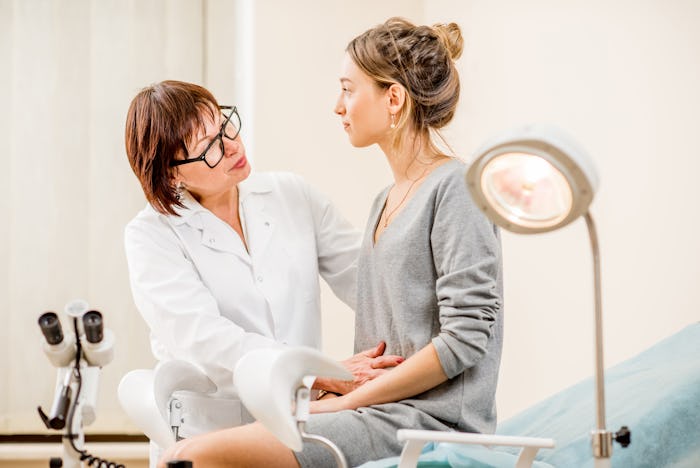Life

Here's What You Need To Know About The Causes Of PCOS & How To Treat It
When I was diagnosed with PCOS in 2013, I was stupidly trying to figure out if it was something I did wrong, whether it was my lifestyle choices, or even if it was hereditary. I didn’t think my mom had it, but back then, PCOS wasn’t really a "thing" yet and it wasn’t discussed. I was wondering what causes PCOS and if there was any way I could cure it. It was rough having heavy, irregular periods, and cramps so painful they would make me pass out. It was also frustrating to be getting exercise and eating healthy, but still continue to gain weight inexplicably. And to put myself out there even more, I hated that I always had to pluck a ton of little hairs from under my chin every single day and I hated when I decided to shave them off because it was easier. But unfortunately, it’s not really clear what the cause of PCOS is.
Dr. Sherry Ross, an OB-GYN and women’s health expert at Providence Saint John’s Health Center in Santa Monica, California and author of She-ology: The Definitive Guide to Women's Intimate Health. Period., says in an email interview with Romper that nobody really knows what causes PCOS, but what we do know is that it’s not hereditary.
Other things we know for sure about PCOS, according to Ross, is “there are increases in hormones called androgens and a resistance to another hormone called insulin. High androgen levels, mainly testosterone, cause unwanted hair growth all over the body, oily skin, and acne. The hormone insulin controls the sugar or glucose levels in our blood. Higher blood levels of insulin cause you to feel hungrier, which can lead to weight gain and obesity. In women with PCOS, estrogen levels tend to be in the normal range while testosterone is in a higher range than most women.” However, Ross adds that while it’s not completely understood, not all women with PCOS will have high levels of testosterone or insulin in their blood. “Everyone presents differently,” she says. “The diagnosis of PCOS is primarily made on your medical history and physical exam. Blood work and a pelvic ultrasound will help in making a diagnosis of PCOS.”
Wondering if you may have PCOS and should get it checked out? Ross offers these symptoms and signs to look out for: “The symptoms of PCOS [include] irregular periods, excessive hair growth, weight gain, obesity, acne, and infertility.” And these symptoms are physically and emotionally disruptive, Ross says. If you are the 5 to 10 percent of women who suffer horribly from the symptoms of PCOS, thankfully, there are treatment options available.
It’s super important to be seen if you think you may have PCOS so you can treat your symptoms, because having screwed up insulin levels is no joke, and you may even have a higher chance of getting uterine cancer according to Ross. Other serious medical conditions that women with PCOS are prone to getting are diabetes, heart attacks, high blood pressure, high cholesterol, depression, anxiety, and sleep apnea, Ross says.
If you’re thinking about trying to conceive, that’s another reason you should get checked out before you start since a lot of women with PCOS do not ovulate regularly because of hormone levels and the weight gain. Thankfully, Ross says there are a lot of medications to help you ovulate. “Clomid is the most common medication to get your ovaries ready to cooperate with ovulation and pregnancy … and is given to help you ovulate regularly, making the egg available to become fertilized. If Clomid fails, Metformin and gonadotropins are next on deck to get your ovaries working properly,” she explains.
Don’t worry, not all hope is lost if you do get that diagnosis. “For those women suffering with PCOS, its best to include a knowledgeable team of experts, including a gynecologist and nutritionist. The good news is there are great treatments to control the symptoms caused by PCOS and adapting certain lifestyle behaviors to help avoid some of the long term medical diseases.” This is especially important since PCOS isn’t curable, just treatable.
No doubt about it, having PCOS sucks — I would know. Unfortunately, it’s still unknown what causes the disease and it seems like until fairly recently, nobody really knew what it was or talked about it. Hopefully folks will begin to discuss this disease more often so women will know the signs to look for and to get checked out by their doctor to — at the very least — manage some of the unpleasant symptoms. And if they’re trying to conceive, get a little help to make that happen.
Check out Romper's new video series, Bearing The Motherload, where disagreeing parents from different sides of an issue sit down with a mediator and talk about how to support (and not judge) each other’s parenting perspectives. New episodes air Mondays on Facebook.
This article was originally published on